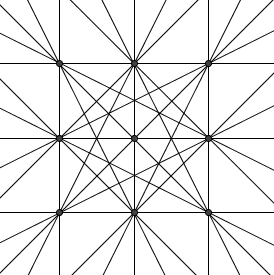Difference between revisions of "2004 AMC 12A Problems/Problem 13"
m (minor edits) |
|||
| Line 4: | Line 4: | ||
<math>\text {(A)}\ 8 \qquad \text {(B)}\ 20 \qquad \text {(C)}\ 24 \qquad \text {(D)}\ 27\qquad \text {(E)}\ 36</math> | <math>\text {(A)}\ 8 \qquad \text {(B)}\ 20 \qquad \text {(C)}\ 24 \qquad \text {(D)}\ 27\qquad \text {(E)}\ 36</math> | ||
| − | |||
== Solution == | == Solution == | ||
[[Image:2004_AMC12A-13.png|center]] | [[Image:2004_AMC12A-13.png|center]] | ||
| Line 23: | Line 22: | ||
First consider how many lines go through <math>(-1, -1)</math> and hit two points in <math>S</math>. You can see that there are <math>5</math> such lines. Now, we cross out <math>(-1, -1)</math> and make sure to never consider consider lines that go through it anymore (As doing so would be double counting). Repeat for <math>(-1, 0)</math>, making sure not to count the vertical line as it goes through the crossed out <math>(-1, -1)</math>. Then cross out <math>(-1, 0)</math>. Repeat for the rest, and count <math>20</math> lines in total. | First consider how many lines go through <math>(-1, -1)</math> and hit two points in <math>S</math>. You can see that there are <math>5</math> such lines. Now, we cross out <math>(-1, -1)</math> and make sure to never consider consider lines that go through it anymore (As doing so would be double counting). Repeat for <math>(-1, 0)</math>, making sure not to count the vertical line as it goes through the crossed out <math>(-1, -1)</math>. Then cross out <math>(-1, 0)</math>. Repeat for the rest, and count <math>20</math> lines in total. | ||
| − | == See | + | == See Also == |
{{AMC12 box|year=2004|ab=A|num-b=12|num-a=14}} | {{AMC12 box|year=2004|ab=A|num-b=12|num-a=14}} | ||
[[Category:Intermediate Combinatorics Problems]] | [[Category:Intermediate Combinatorics Problems]] | ||
http://www.artofproblemsolving.com/Wiki/index.php?title=2004_AMC_12A_Problems/Problem_14&action=edit§ion=3 | http://www.artofproblemsolving.com/Wiki/index.php?title=2004_AMC_12A_Problems/Problem_14&action=edit§ion=3 | ||
Latest revision as of 23:58, 18 October 2020
Problem
Let ![]() be the set of points
be the set of points ![]() in the coordinate plane, where each of
in the coordinate plane, where each of ![]() and
and ![]() may be
may be ![]() ,
, ![]() , or
, or ![]() . How many distinct lines pass through at least two members of
. How many distinct lines pass through at least two members of ![]() ?
?
![]()
Solution
Solution 1
Let's count them by cases:
- Case 1: The line is horizontal or vertical, clearly
 .
. - Case 2: The line has slope
 , with
, with  through
through  and
and  additional ones one unit above or below those. These total
additional ones one unit above or below those. These total  .
. - Case 3: The only remaining lines pass through two points, a vertex and a non-vertex point on the opposite side. Thus we have each vertex pairing up with two points on the two opposites sides, giving
 lines.
lines.
These add up to ![]() .
.
Solution 2
There are  ways to pick two points, but we've clearly overcounted all of the lines which pass through three points. In fact, each line which passes through three points will have been counted
ways to pick two points, but we've clearly overcounted all of the lines which pass through three points. In fact, each line which passes through three points will have been counted  times, so we have to subtract
times, so we have to subtract ![]() for each of these lines. Quick counting yields
for each of these lines. Quick counting yields ![]() horizontal,
horizontal, ![]() vertical, and
vertical, and ![]() diagonal lines, so the answer is
diagonal lines, so the answer is ![]() distinct lines.
distinct lines.
Solution 3
First consider how many lines go through ![]() and hit two points in
and hit two points in ![]() . You can see that there are
. You can see that there are ![]() such lines. Now, we cross out
such lines. Now, we cross out ![]() and make sure to never consider consider lines that go through it anymore (As doing so would be double counting). Repeat for
and make sure to never consider consider lines that go through it anymore (As doing so would be double counting). Repeat for ![]() , making sure not to count the vertical line as it goes through the crossed out
, making sure not to count the vertical line as it goes through the crossed out ![]() . Then cross out
. Then cross out ![]() . Repeat for the rest, and count
. Repeat for the rest, and count ![]() lines in total.
lines in total.
See Also
| 2004 AMC 12A (Problems • Answer Key • Resources) | |
| Preceded by Problem 12 |
Followed by Problem 14 |
| 1 • 2 • 3 • 4 • 5 • 6 • 7 • 8 • 9 • 10 • 11 • 12 • 13 • 14 • 15 • 16 • 17 • 18 • 19 • 20 • 21 • 22 • 23 • 24 • 25 | |
| All AMC 12 Problems and Solutions | |











